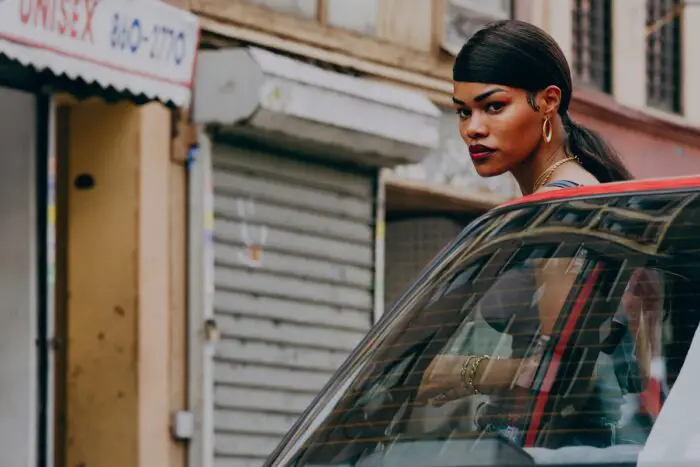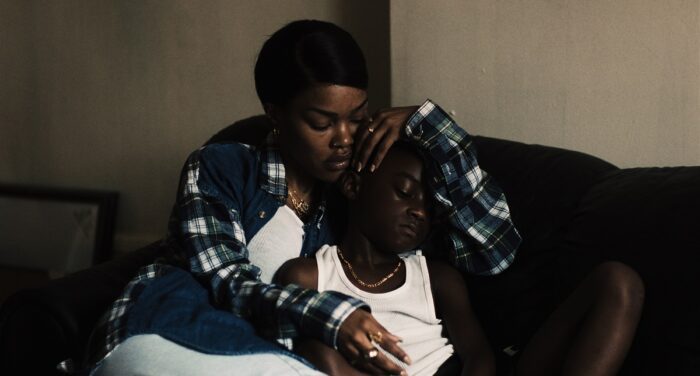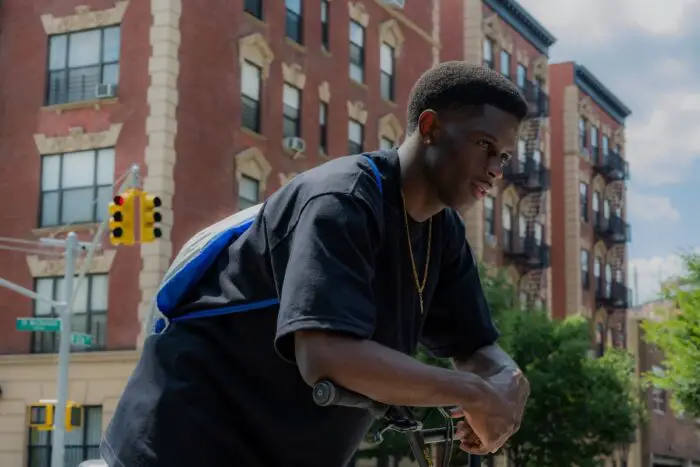The moment I heard of A Thousand and One, I had a sensation that it was going to be something unique. I’ve harbored such feelings about films pre-release and gotten burned once or twice before, but I’m pleased to report back that, this time, my instincts didn’t lead me astray.
Before I press forward, I recognize my position as a white person writing on a movie by and about Black people. Should I say anything that oversteps a boundary, please do not hesitate to let me know.

A Thousand and One follows a young woman named Inez, fresh out of a women’s institution, and her quest to rescue her little boy, Terry, from foster care. The foster care system is a tricky subject. Amidst all the calls to adopt for one reason or another, we forget how difficult it is. Adopting a child can cost thousands of dollars, and the ones with those thousands may not always be worthy of parenthood. Children risk mistreatment in and out of foster care. Inez knows that; she was within and scalded by those walls, and we’re made aware of this before the story gets into its meat.
I suppose the use of “steal” in the film’s logline could push some viewers to see Inez through an antagonistic filter, but as someone who is aware of the foster care systems shortcomings (to put it gently), “steal” felt more like a funny way to put “saved.” No matter the reason Terry wound up there, the reality is that he is jumping out of windows and breaking his head open to escape wherever the system puts him. He does not run from Inez, and Inez runs toward him. We get to see her point of view as someone who survived foster care herself, and are led to being on her side through understanding and an appreciation of her ethics.

What it means to be a “blood relative” gets a redefinition I haven’t yet seen in my short life of watching movies. I’m no stranger to found family, but that trope seems to focus on the irrelevance of blood relation. There is a moment in A Thousand and One where, after Inez and her partner, Lucky’s, wedding, Terry is seen crying off to the side. Lucky approaches him, consoles him, and says, “you’re blood now.” Being blood becomes acceptance of another’s blood as one’s own rather than a birth inheritance. Something about that feels more impactful than your average found family story.
As imperfect as Lucky is, he is one of my favorite movie dads in recent memory. The prospect of fatherhood is tossed at him, and at first it appears he isn’t going to pick it up. With male characters like this, I’m accustomed to bracing for them to be stony to the child in question. While Lucky does take time to come around and makes a big mistake or two along the way, he does nothing but love Terry. There is a scene of the pair of them talking on a basketball court that just about broke me in two with its sweetness. To have a film display such love is a necessity in my life right now, restoring faith in the good that’s out there.
It feels rare to find a movie that presents its characters as flawed as A Thousand and One does, yet never feels like I’m being led to hate them. They do and say things that many, I included, will deem morally incorrect, but we are not asked to view any of our main cast as irredeemable. We are asked to see complex individuals as they are. It is, first and foremost, sympathetic towards each central character. Nuanced filmmaking such as this doesn’t always land, but A.V. Rockwell seems to know how to strike the perfect chord.
Film is an emotionally charged medium, and it’s always been easy for me to really hate or really love a character. Many viewers are used to a villain or antagonist. A Thousand and One has antagonists, but they are systems, walls in the way of Inez and her family. There is an air of helplessness, watching our fellow human beings behind a screen as they try to exist amidst the fragility of the life they’ve built, while also surrounded by a changing world as well as the constants of racism and stereotyping.
The camera that leads us through this delicate story is gentle, like brush strokes on a painting like that of the film’s exquisite poster art. It calls for your attention; details are woven finely into the screen, and I could sense that I wasn’t supposed to look away or get lost in a daydream. These underlines are finely tuned in a way that brings to my mind the greats in mise-en-scène, a list that Rockwell will undoubtedly join.

This film encases multiple different talking points and themes, and I feel like many viewers will walk away having each noticed something different. For me, it is a film that gives love to kinds of people often cast out or overlooked, and asks for us to love them, too—but more notably, it asks for us to respect them. It is a story so personal, yet so inviting in that it shows us lives, people we know and have seen, lit in familiar lightbulbs and midday sun. A Thousand and One can and should be jotted down in our history books as a triumph of cinematic minimalism and storytelling.
“This isn’t goodbye.“


